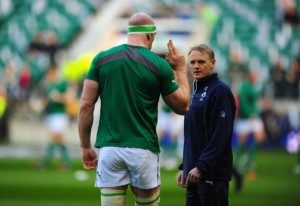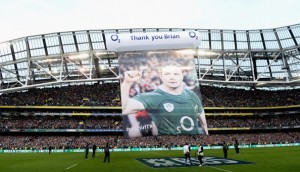
Try guy: Andrew Trimble scored one of Ireland’s seven tries against Italy on Saturday. The final score was 46-7
By Claire Glancy
Patience pays
When Jonathan Sexton scored his first try just six minutes in, there was a sense that a rout was on the cards. Eventually that would be the case, but during the next half an hour Ireland allowed Italy to draw level and for all their dominance in terms of territory and possession, they struggled to breach the Italian line again. From an Irish fan’s perspective, this was supposed to be the match where the team racked up their points difference ahead of the showdown in Paris but Italy were determined not to be walked over.
As well as the cheers, Andrew Trimble’s try was met with a collective sigh of relief as it helped extend the Ireland’s lead to ten points going in at the break and, of course, another five tries lay in waiting. Despite what looked like quite a slow start, Joe Schmidt let us in on a secret afterwards – this was all part of the plan. Paul O’Connell’s comments complimented those of his coach, saying that all week they had talked about the importance of being patient. With Ireland keeping hold of the ball so much of the match, Italy had to make a monstrous 208 tackles – a record by any side in the Six Nations. This eventually tired out what had been an impressive Italian defence.
More forward momentum is needed
It’s difficult to start finding faults when a side scores seven tries and is top of the table but as we are four rounds in, it’s time to get picky. In the first half in particular, the Irish pack were often too flat and for all the possession and territory Ireland had the Italian defence rarely looked threatened. If the forwards took the ball with more speed and the backs played with more depth (as they did against Wales) then Ireland would penetrate the defence more and ask bigger questions of the opposition.
Spoilt for choice with a clean bill of health
Apart from the opening win against Wales, Ireland’s championship last year was one to forget. Declan Kidney paid the price for a poor run of form but his cause wasn’t helped by the fact that there were so many injuries in the squad during the Championship. This time around Ireland have been much more fortunate. Tommy Bowe and Sean O’Brien were big losses but because they were ruled out before the tournament even started, it allowed everyone else to get on with their job.
Apart from the odd ‘knock’ there have been hardly any injuries to report – unless you were at Racing Métro last week because apparently in France Jonathan Sexton is out for six weeks…. Schmidt has had the luxury of consistency in terms of the players presented in front of him and admitted that he didn’t want to risk playing Peter O’Mahony against Italy because he wants him fit for Paris.
There is much more to learn
Since the All Blacks match in the autumn we have learned that Ireland’s set piece is exceptional, discipline has improved, their defence is strong and they can score tries. The downside to Schmidt’s squad staying fit is that we haven’t the chance to see much of the players waiting in the wings.
There are very few competitive internationals between now and the Rugby World Cup so this match could have been used to give more game time to some of the younger squad members. Having said that, the decision taken by the Irish management is completely vindicated as they go to Paris with their fate in their own hands (barring a cricket score for England in Rome).
‘The Magician’ will be missed
He’s taken a bit of a battering the last couple of years with critics quick to point out how his pace has dropped off and he’s not the attacking threat he once was but Saturday showed just how much Irish rugby would miss Brian O’Driscoll… I don’t just mean the send-off and huge roar from the crowd every time he was shown on the big screen, but the glimpses of magic he brings to play on the field.
For all the knocks to the head he has taken, O’Driscoll’s creativity is a gift that has never been dented. Three of Ireland’s tries came from lovely, improvised passes. He was often the spark in attack and the one who provided the key to unlocking the Italian defence. O’Driscoll properly announced himself to the rugby world with that hatrick in Paris fourteen years ago, the last time Ireland managed to win there. I know it’s sentimental, romantic and reeks of cheese but it would be a fitting finale for the world’s most capped rugby international to finish his career winning silverware there.
Click here to see what’s in this month’s edition of Rugby World!








